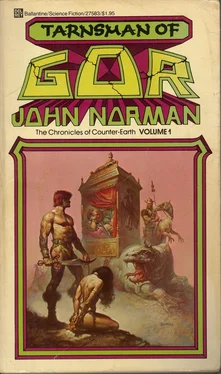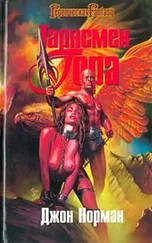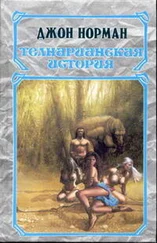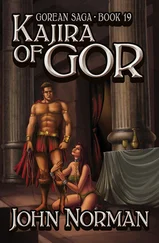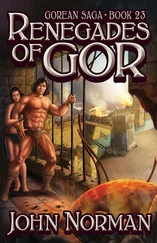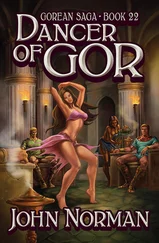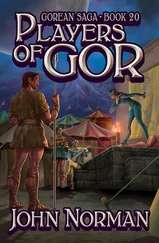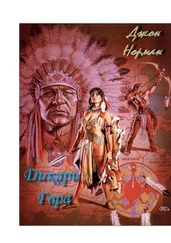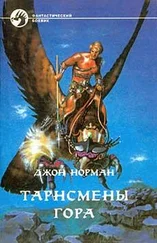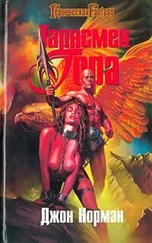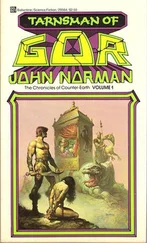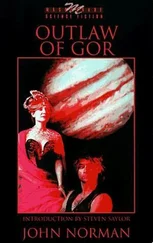Just as the fire was sputtering out, I noticed a glint in the ashes. Bending down, I retrieved the ring. It was warm from the ashes, hard, substantial — a piece of reality. It was there. I dropped it into the pocket of my coat and started off on my compass — bearing, trying to make my way back to the highway.
I felt stupid trying to hike in the dark. I was asking for a broken leg or ankle, if not a neck. Still, if I could put a mile or so between myself and the old camp, that should be sufficient to give myself the margin of safety I needed — from what I didn't know. I might then wait until morning and start off in the light, secure, confident. Moreover, it would be a simple matter to cover one's tracks in the light. The important thing was not to be at the old camp.
I had made my way perilously through the darkness for perhaps twenty minutes when, to my horror, my knapsack and bedroll seemed to burst into blue flame on my back. It was an instant's action to hurl them from me, and I gazed, bewildered, awe-stricken, at what seemed to be a furious blue combustion that lit the pines on all sides as if with acetylene flames. It was like staring into a furnace. I knew that it was the envelope that had burst into flame, taking with it my knapsack and bedroll. I shuddered, thinking of what might have happened if I had been carrying it in the pocket of my coat.
Strangely enough, now that I think of it, I didn't run headlong from the spot, though I can't see why, and the thought did cross my mind that the bright, flarelike luminescence would reveal my position, if it was of interest to anyone or anything. With a small flashlight I knelt beside the flakes of my knapsack and bedroll. The stones on which they had fallen were blackened. There was no trace of the envelope. It seemed to have been totally consumed. There was an unpleasant, acrid odor in the air, some fumes of a sort that I was not familiar with.
The thought came to me that the ring, which I had dropped in my pocket, might similarly burst into flame, but, unaccountably perhaps, I doubted it. There might be a point in someone's destroying the letter, but presumably there would be little point or no point in destroying the ring. Why should it have been sent if not to have been kept?
Besides, I had been warned about the letter — a warning I had foolishly neglected — but had been asked to carry the ring. Whatever it was, father or no, that was the source of these frightening events, it did not seem to wish me harm, but then, I thought, somewhat bitterly, floods and earthquakes presumably wish no one harm either. Who knew the nature of the things or forces that were afoot that night in the mountains, things and forces that might perhaps smash me, casually, as one innocently steps on an insect without being aware of it or caring?
I still had the compass, and that constituted a firm link to reality. The silent but intense explosion of the envelope into flames had caused me momentarily to become confused — that and the sudden return to the darkness from the hideous glaring light of the disintegrating envelope. My compass would get me out. With my flashlight I examined it. As the thin, sharp beam struck the face of the compass, my heart stopped. The needle was spinning crazily, and oscillating backward and forward, as if the laws of nature had suddenly been abridged in its vicinity.
For the first time since I had opened the envelope, I began to lose my control. The compass had been my anchor and trust. I had counted on it. Now it had gone crazy. There was a loud noise, but I now think it must have been the sound of my own voice, a sudden frightened shriek for which I shall always bear the shame.
The next thing I was running like a demented animal, in any direction, every direction. How long I ran I don't know. It may have been hours, perhaps only a few minutes. I slipped and fell dozens of times and ran into the prickly branches of the pines, the needles stabbing at my face. I may have been sobbing; I remember the taste of salt in my mouth. But mostly I remember a blind, headlong flight, a panic-stricken, unworthy, sickening flight. Once I saw two eyes in the darkness and screamed and ran from them, hearing the flap of wings behind me and the startled cry of an owl. Once I startled a small band of deer and found myself in the midst of their bounding shapes buffeting me in the darkness.
The moon came out, and the mountainside was suddenly lit with its cold beauty, white on the snow in the trees and on the side of the slope, sparkling on the rocks. I could run no further. I fell to the ground, gasping for breath, suddenly asking myself why I had run. For the first time in my life I had felt full, unreasoning fear, and it had gripped me like the paws of some grotesque predatory animal. I had surrendered to it for just a moment, and it had become a force that had carried me, hurling me about as if I were a swimmer captured in surging waves — a force that could not be resisted. It had departed now. I must never surrender to it again. I looked around and recognized the platform of rock near which I had set my bedroll. I saw the ashes of my fire. I had returned to my camp. Somehow I'd known that I would.
As I lay there in the moonlight, I felt the earth beneath me, against my aching muscles and the body that was covered with the foul-smelling sheen of fear and sweat. I felt then that it was good even to feel pain. Feeling was the important thing. I was alive.
I saw the ship descend. For a moment it looked like a falling star, but then it suddenly became clear and substantial, like a broad, thick disk of silver. It was silent and settled on the rock platform, scarcely disturbing the light snow that was scattered on it. There was a slight wind in the pine needles, and I rose to my feet. As I did so, a door in the side of the ship slid quietly upward. I must go in. My father's words recurred in my memory: "The fate is upon you." Before entering the ship, I stopped at the side of the large, flat rock on which it rested. I bent down and scooped up, as my father had asked, a handful of our green earth. I, too, felt that it was important to take something with me, something which, in a way, was my native soil. The soil of my planet, my world.
Chapter 2
The Counter-Earth
I REMEMBERED NOTHING, FROM THE time I'd boarded the silver disk in the mountains of New Hampshire until now. I awoke, feeling rested, and opened my eyes, half expecting to see my room in the alumni house at the college. I turned my head, without pain or discomfort. I seemed to be lying on some hard, flat object, perhaps a table, in a circular room with a low ceiling some seven feet high. There were five narrow windows, not large enough to let a man through; they rather reminded me of ports for bowmen in a castle tower, yet they admitted sufficient light to allow me to recognize my surroundings.
the earth was blue. My first thought was that this must be the earth and the sun's apparent size an illusion.
Obviously, I was breathing, and that meant necessarily an atmosphere containing a large percentage of oxygen. It must be the earth. But as I stood at the window, I knew that this could not be my mother planet. The building in which I found myself was apparently one of an indefinite number of towers, like endless flat cylinders of varying sizes and colors, joined by narrow, colorful bridges that arched lightly between them.
I could not lean far enough outside the window to see the ground. In the distance I could see hills covered with some type of green vegetation, but I could not determine whether or not it was grass. Wondering at my predicament, I turned back to the table. I strode over to it and nearly bruised my thigh on the stone structure. I felt for a moment as though I must have stumbled, have been dizzy. I walked around the room. I leaped to the top of the table almost as I would have climbed a stair in the alumni house. It was different, a different movement. Less gravity. It had to be. The planet, then, was smaller than our earth, and, given the apparent size of the sun, perhaps somewhat closer to it.
Читать дальше
